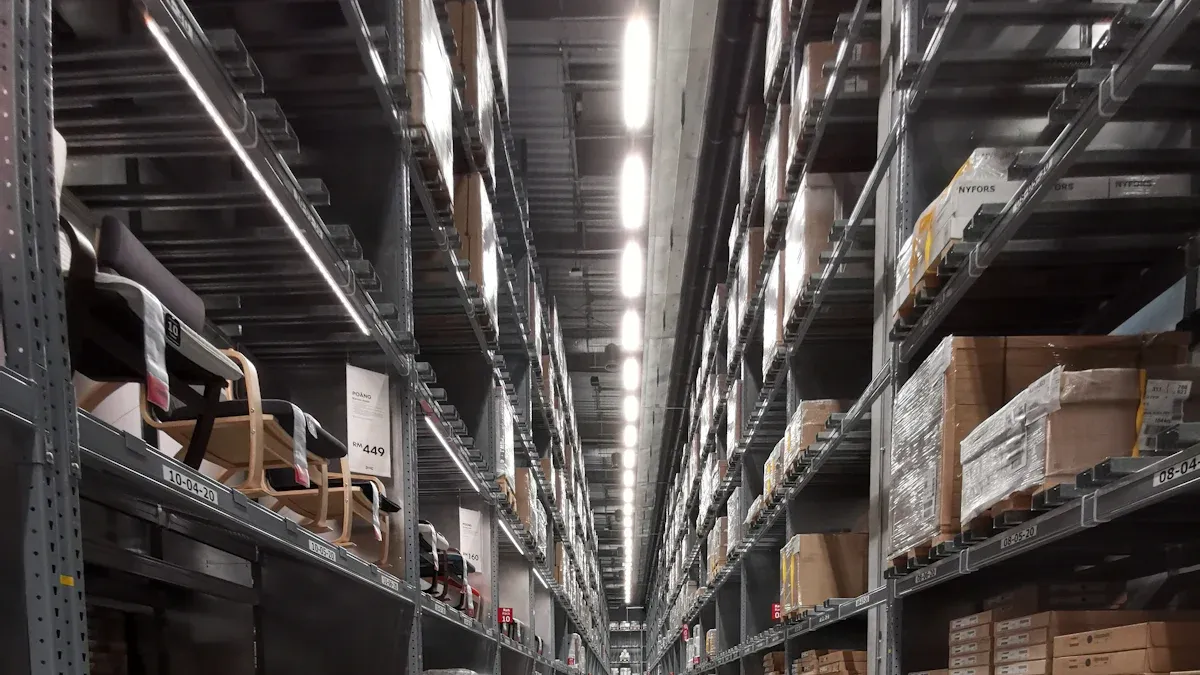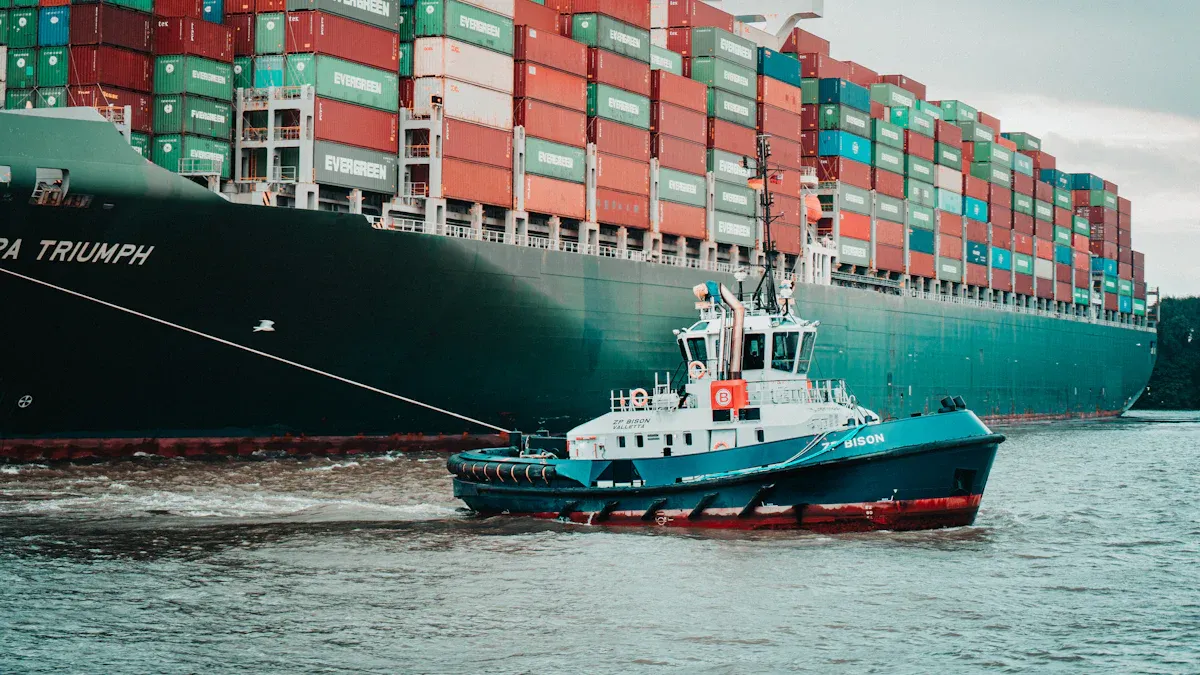10 Effective Tips to Cut Logistics Costs in 2025

Managing logistics costs is key to making profits in 2025. Use smart ways to save money for steady growth. Using new tech like AI and IoT makes logistics better. Saving money by planning routes and grouping shipments is important. These steps help lower costs and make deliveries cheaper.
Key Takeaways
Use AI tools to plan routes. This saves time and cuts fuel costs. Companies can save up to 25% on transport costs by improving routes.
Combine shipments using freight consolidation. This can cut costs by 40% and make deliveries faster.
Hire experts like JUSDA for logistics tasks. This helps you focus on your main work while using better logistics services.
Make Transportation Routes Better to Save Money
Try AI Tools for Route Planning
AI tools can change how you plan delivery routes. They study lots of data to find the best paths. Using them saves time, gas, and money. For example, knowing the best routes early avoids delays and speeds up deliveries. This lowers costs and makes customers happier.
Many businesses already use AI tools for route planning. For example, Swift Logistics used them to cut fuel use by 20% and deliver faster by 30%. Express Fulfillment saved 25% on transport costs and improved on-time deliveries by 40%. These examples show how AI tools save money and improve logistics.
Using these tools is a great way to cut costs. They help you plan routes better, handle more deliveries, and improve logistics work.
Use Live Traffic and Weather Info
Live traffic and weather info can help your logistics. Adding this info to your plans avoids traffic and bad weather. This saves travel time and gas, cutting costs.
Smart route software uses this info to change routes quickly. It helps deliveries stay on time, works better, and cuts pollution. Companies using this software save gas money and make customers happy.
Adding live data to your plans is a smart move. It helps avoid delays and keeps things running smoothly.
Combine Shipments to Lower Transportation Logistics Costs
Use Freight Consolidation Methods
Freight consolidation is a smart way to save money. It combines small shipments into bigger ones to use space better. This helps you get cheaper rates from carriers, cutting costs. For example, joining less-than-truckload (LTL) and parcel shipments into full truckload (FTL) trailers saves money and improves efficiency.
Companies using smart tools for consolidation see great results. These tools can lower costs by 40% and speed up deliveries by 10 days. Grouping supplies from different vendors into fewer shipments also helps. While it might take a bit longer, the savings are worth it.
Good planning is key for high consolidation rates. Smart shipment methods use containers better and reduce trips. This not only cuts costs but also helps the environment by using less fuel.
Work with Third-Party Logistics Providers (3PLs) Like JUSDA
Teaming up with a trusted 3PL like JUSDA makes consolidation easier. JUSDA offers custom solutions to cut logistics costs for many industries. With their global network and advanced tools, they find ways to combine shipments and improve transport.
JUSDA’s skills in handling supply chains ensure smooth deliveries. Their JusLink platform shows real-time tracking and inventory updates. This makes managing shipments simple. By working with JUSDA, you can focus on your business while they handle logistics. This partnership lowers costs and boosts efficiency.
Tip: Use technology with consolidation. Tools like JusLink help track shipments and plan routes to save more.
Use Automation in Warehouses to Cut Logistics Costs
Try Automated Storage and Retrieval Systems (AS/RS)
Automated Storage and Retrieval Systems (AS/RS) are helpful for warehouses. These systems use machines to store and get items quickly. Automating these tasks lowers labor costs and avoids mistakes. AS/RS also saves space, letting you store more in less room.
For example, AS/RS can do simple jobs like moving items from high shelves. This means fewer workers are needed, and work gets done faster. Companies using AS/RS often fill orders quicker and spend less on logistics. These systems also work with inventory tools to track stock in real time. This helps you plan better and avoid having too much or too little stock.
Use Robots for Picking and Packing in JUSDA Warehouses
Robots are changing how warehouses work. In JUSDA warehouses, robots pick and pack items very efficiently. They use data to improve tasks and make smart choices. This reduces the need for workers and speeds up the process. Automating these jobs saves money and makes logistics better.
Robots also help workers by reducing heavy lifting, which prevents injuries. This makes workers safer and more productive. AI-powered robots also handle paperwork, reducing mistakes and following rules. Self-driving robots in warehouses organize tasks and routes, saving time and speeding up orders. These methods cut costs and improve logistics performance.
JUSDA warehouses use advanced robots to get these results. By using robots, you can save money, automate tasks, and stay ahead in the logistics industry.
Use IoT for Tracking and Cutting Logistics Costs
Track Fleet Performance with IoT Sensors
IoT sensors help track fleet performance in real time. They collect data on fuel use, vehicle health, and driver habits. This data shows problems, saves fuel, and avoids big repairs. For example, sensors warn about maintenance needs before breakdowns happen. This saves both time and money.
Many companies save money using IoT for fleet management. Here are some examples:
Company | What They Do with IoT | How It Saves Money |
|---|---|---|
H. Robinson | Tracks freight and routes with IoT. | Better routes save money and improve efficiency. |
DB Cargo | Uses IoT sensors to plan maintenance. | Stops sudden failures, cutting repair costs. |
Walmart | Uses IoT tablets for better communication and deliveries. | Speeds up work and reduces manual tasks, saving money. |
Using IoT sensors improves fleet work, lowers costs, and boosts efficiency.
Improve Inventory Tracking with IoT
IoT devices help track inventory across the supply chain. They give real-time updates on stock levels and locations. This helps avoid having too much or too little stock.
Here’s how better inventory tracking helps:
You can track stock instantly, making operations smoother.
Keeping the right stock levels saves storage costs.
Smarter routes cut delivery costs and save time.
Fixing problems quickly saves money and improves processes.
IoT also predicts demand changes, so you stock the right amount. This reduces waste and makes logistics more efficient. Real-time tracking shows where to improve, saving money and time.
Using IoT for inventory is a smart way to cut costs and keep things running well.
Use Blockchain for Clearer Supply Chains
Save Money with Smart Contracts
Smart contracts make supply chain tasks easier by automating them. These digital tools work on their own when rules are met. They cut down on paperwork and speed up work. For example, payments can happen right after delivery, saving time and avoiding arguments.
Smart contracts also make things clearer. Everyone sees the same secure data, so there are fewer disagreements. This saves time and money spent on solving problems. They also help manage stock by tracking levels and reordering items automatically. These methods make work smoother and lower logistics costs.
Tip: Pair smart contracts with IoT tools for better results. IoT sensors can start actions, like reordering items when stock is low.
Track Better to Avoid Losses
Blockchain helps track every step of your supply chain. It keeps a shared, secure record that shows what’s happening in real time. This makes it easier to find problems, stop fraud, and save money. For example, if a shipment is lost, blockchain records show where it went wrong.
Better tracking also helps manage risks. Blockchain spots possible issues early, so you can fix them fast. This reduces delays and keeps things running smoothly. Experts say blockchain could save $40 billion yearly by cutting fraud and mistakes.
Using blockchain with smart contracts and IoT makes things even better. These tools work together to automate tasks, speed up deliveries, and improve clarity. Adding blockchain to your system creates a stronger and cheaper supply chain.
Negotiate Better Rates with Carriers to Reduce Shipping Costs
Build Long-Term Relationships with Carriers
Working closely with shipping carriers can save money. Carriers often give better deals to loyal customers. Long-term partnerships lead to lower costs and better service. For example, helping carriers during tough times can bring rewards. These include faster deliveries or lower fees.
One company saved money by building strong carrier ties. They reduced late delivery fines by 65% and other penalties by 73%. They also became a "shipper of choice," gaining special services. These included custom solutions that matched their business goals. This shows how teamwork can cut shipping costs.
To improve relationships, stay honest and dependable. Share your shipping plans and any problems with carriers. Being open builds trust and makes things run smoothly. This helps lower your logistics costs.
Use Data Analytics to Strengthen Negotiation Power
Data analytics helps you save on shipping costs. By studying past trends and prices, you can negotiate better deals. For example, if a supplier delivers late 15% of the time, you can ask for penalties. Comparing prices may also show if a carrier charges too much.
Knowing when demand will rise helps you plan ahead. You can ask for discounts by promising more shipments. Sharing data like delivery times or error rates strengthens your case. Running "what-if" scenarios shows how different deals affect costs.
Using data makes negotiations smarter and shipping costs steady. This way, you get the best rates and keep good service.
Reduce Fuel Costs with Sustainable Transportation Solutions

Switch to Electric or Hybrid Vehicles
Using electric or hybrid vehicles can save money on fuel. These vehicles use less or no fuel, making them cheaper over time. While they cost more at first, their lower fuel and repair costs save money later.
Aspect | Electric/Hybrid Vehicles | Traditional Vehicles |
|---|---|---|
Starting Price | Higher | Lower |
Fuel Costs | Much Lower | Higher |
Repair Costs | Lower | Higher |
Long-term Savings | Big | None |
Electric and hybrid vehicles cut fuel use and save money. They work well in cities with stop-and-go traffic. Switching to these vehicles helps save money and protect the environment.
Teach Drivers Fuel-Saving Driving Skills
Teaching drivers fuel-saving skills helps lower shipping costs. Small changes in driving can save a lot of fuel. For example:
Proper training improves fuel use by 1.9% to 17%.
Companies see about 5% better fuel efficiency.
Greenhouse gas emissions drop by 2% to 8%.
Ask drivers to avoid quick starts, keep steady speeds, and stop idling. These habits use less fuel and lower costs. Training also helps drivers plan better routes, cutting extra miles. By teaching drivers, you save money and improve logistics.
Tip: Combine driver training with better vehicles for the best savings.
Use Green Practices to Lower Logistics Costs
Choose Eco-Friendly Packaging
Using eco-friendly packaging can save money and help your brand. Materials like biodegradable or recyclable options might cost more at first. But they bring long-term benefits that make up for the extra cost.
Green packaging improves your brand's image. People like companies that care about the planet.
It builds trust with eco-conscious buyers, encouraging them to shop again.
Happy customers may recommend your business, increasing your sales.
Switching to sustainable packaging reduces waste and attracts eco-friendly shoppers. It also lowers costs over time by cutting packaging waste and using space better during shipping.
Plan Deliveries Better to Cut Emissions
Better delivery planning helps save money and reduce pollution. Smart tools and data can create efficient routes. This lowers fuel use and shipping costs.
Packing trucks well means fewer vehicles are needed, reducing costs and emissions.
Using live traffic and weather updates avoids delays and saves fuel.
Good scheduling makes deliveries on time and avoids wasted trips. This reduces vehicle idle time and improves your supply chain. By following these steps, you save money and help the environment.
Tip: Use green packaging and smart delivery plans together for the best savings and sustainability.
Improve Demand Forecasting with JUSDA’s JusLink Platform
Use AI and Machine Learning for Better Predictions
AI and machine learning can change how you predict demand. These tools study big amounts of data to find patterns. They make forecasts up to 30% more accurate than old methods. This means fewer mistakes and better planning for your logistics.
AI also updates forecasts quickly when trends change. For example, if the market shifts, AI tools adjust predictions fast. This helps you act quickly, saving money and improving efficiency.
Here’s how AI and machine learning help:
They study complex data to find hidden patterns.
They make forecasts more accurate, avoiding too much or too little stock.
They update predictions in real time, keeping your supply chain flexible.
Using AI tools like JUSDA’s JusLink platform improves logistics and keeps you ahead in business.
Match Inventory with Market Needs
Keeping inventory levels right saves money on shipping and storage. JUSDA’s JusLink platform gives real-time updates on stock and demand. This helps you stock the right items at the right time, avoiding waste or shortages.
Here are some examples:
Example | Result |
|---|---|
A logistics company used demand tools to cut inventory costs. | |
A grocery distributor used ERP to save on logistics costs. | 30% lower logistics expenses |
These examples show how matching inventory to demand saves money. JusLink helps you track stock, adjust levels, and improve your supply chain. This lowers costs and makes logistics run smoothly.
Outsource Non-Core Logistics Tasks to JUSDA
Work with Expert Logistics Providers
Outsourcing logistics tasks to experts like JUSDA can help a lot. These providers use advanced tools and smart processes to improve your supply chain. Partnering with them lowers costs and makes things run better. For example, JUSDA’s JusLink platform tracks shipments and manages inventory in real time, reducing mistakes.
Expert providers also adjust to your needs. They can handle busy times or slow periods easily. This means you only pay for what you use, saving money. Their knowledge also ensures they follow rules and avoid delays, keeping your business safe.
Here’s why outsourcing helps:
Save money by avoiding the high costs of in-house logistics.
Get expert help to ensure smooth and legal operations.
Adjust services based on your business needs.
By choosing JUSDA, you get a trusted partner to improve your supply chain while you focus on growing your business.
Use Your Resources for Core Business Goals
Outsourcing logistics lets you focus on what you do best. Managing logistics yourself can take time and energy away from your main goals. Letting JUSDA handle it gives you more time for innovation, customer care, and expanding your market.
Experts like JUSDA also improve quality and share risks. Their skills ensure smooth operations, so you can use your resources better. For example, JUSDA’s global network and smart tools make logistics cheaper and more efficient.
The table below shows why outsourcing is helpful:
Benefit | What It Means |
|---|---|
Cost Savings | Skip the high costs of running logistics yourself. |
Better Efficiency | Use your resources wisely and get faster services. |
Improved Quality | Get better service and share risks with experts. |
Smarter Resource Use | Focus on your strengths while experts handle logistics. |
By outsourcing to JUSDA, you can concentrate on your business while they manage the logistics challenges.

JUSDA Solutions
To provide you with professional solutions and quotations.
Cutting logistics costs is important to stay ahead in 2025. Mixing old methods with new tools like JUSDA’s helps improve work. Begin using these ideas now to make logistics better and save money. Even small steps today can bring big savings in the future.
See Also
Mastering Cost Reduction Strategies In Logistics Management
Unlocking Cost Savings: Expert Tips For Supply Chains
Understanding Supply Chain Costs: A Comprehensive Overview
Five Key Trends Shaping The Future Of Supply Chains
Discover Five Cutting-Edge Techniques For Supply Chain Success
